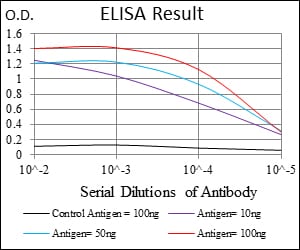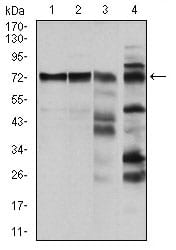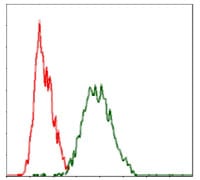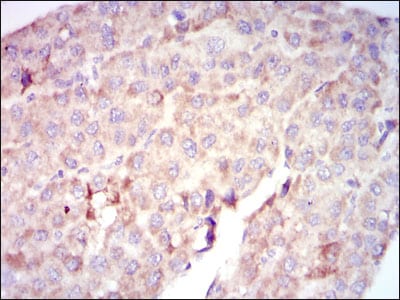



| WB | 咨询技术 | Human,Mouse,Rat |
| IF | 咨询技术 | Human,Mouse,Rat |
| IHC | 1/30-1/150 | Human,Mouse,Rat |
| ICC | 技术咨询 | Human,Mouse,Rat |
| FCM | 咨询技术 | Human,Mouse,Rat |
| Elisa | 1/1000-1/2000 | Human,Mouse,Rat |
| Aliases | NS5; CRAF; Raf-1; c-Raf |
| Entrez GeneID | 5894 |
| clone | 4G4 |
| Host/Isotype | Mouse IgG1 |
| Antibody Type | Primary antibody |
| Storage | Store at 4°C short term. Aliquot and store at -20°C long term. Avoid freeze/thaw cycles. |
| Species Reactivity | Human |
| Immunogen | Purified recombinant fragment of human RAF1 expressed in E. Coli. |
| Formulation | Purified antibody in PBS with 0.05% sodium azide |
+ +
以下是关于IQGAP2抗体的3篇参考文献的简要概括:
1. **"IQGAP2 suppresses gastric cancer progression via regulating Wnt/β-catenin signaling"**
*作者:Li Y, et al.*
摘要:研究利用IQGAP2抗体通过免疫组化分析胃癌组织,发现IQGAP2低表达与患者预后不良相关,并证实其通过抑制Wnt/β-catenin信号通路抑制肿瘤侵袭。
2. **"IQGAP2 deficiency leads to enhanced insulin signaling and glucose uptake in the liver"**
*作者:Wang X, et al.*
摘要:通过Western blot和免疫沉淀技术(使用IQGAP2抗体),发现IQGAP2敲除小鼠肝脏中胰岛素受体信号通路异常激活,提示其在糖代谢调控中的作用。
3. **"The role of IQGAP2 in hepatocellular carcinoma: A tumor suppressor by modulating cytoskeletal dynamics"**
*作者:Chen L, et al.*
摘要:结合免疫荧光(IQGAP2抗体)和功能实验,证明IQGAP2通过调控Rac1/Cdc42通路抑制肝癌细胞迁移和侵袭,其缺失促进肿瘤转移。
注:以上为示例性内容,实际文献需通过学术数据库(如PubMed)检索具体信息。
The IQGAP2 antibody is a research tool designed to detect and study IQGAP2. a member of the IQ motif-containing GTPase-activating protein (IQGAP) family. IQGAP proteins, including IQGAP1. IQGAP2. and IQGAP3. function as scaffolding molecules regulating cellular processes such as cytoskeletal dynamics, cell adhesion, and signaling. IQGAP2. encoded by the *IQGAP2* gene, interacts with Rho-family GTPases (e.g., Cdc42. Rac1) and other partners to modulate cell polarity, migration, and vesicle trafficking. Unlike IQGAP1. which is linked to cancer progression, IQGAP2 is implicated in metabolic regulation and tumor suppression, particularly in liver and gastrointestinal tissues.
IQGAP2 antibodies are widely used in techniques like Western blotting, immunohistochemistry, and immunofluorescence to assess protein expression, localization, and interactions. Their specificity is critical, as IQGAP2 shares structural homology with IQGAP1. necessitating validation to avoid cross-reactivity. Studies employing these antibodies have revealed IQGAP2’s role in maintaining tissue integrity, glucose homeostasis, and apoptosis. Dysregulation of IQGAP2 is associated with diseases such as hepatocellular carcinoma, diabetes, and non-alcoholic fatty liver disease (NAFLD), highlighting its potential as a therapeutic or diagnostic target.
Research continues to explore IQGAP2’s molecular mechanisms, with its antibody serving as a key reagent in dissecting pathways involving GTPase signaling, cell-cell junctions, and metabolic regulation.
×